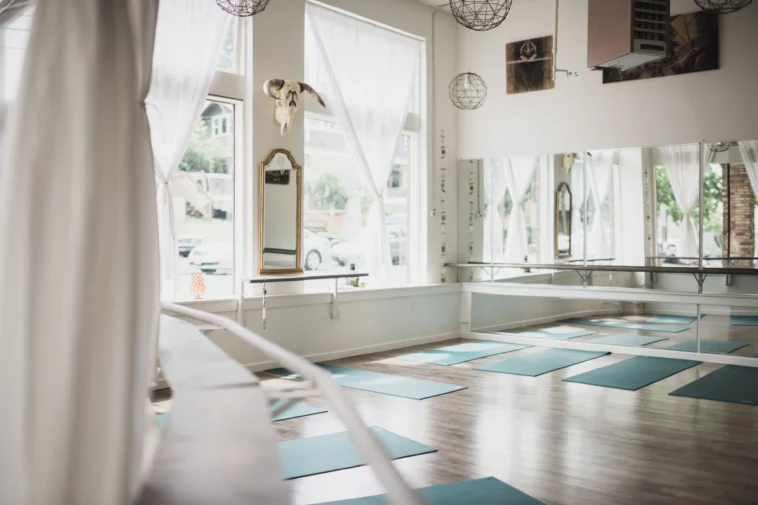Introduction
Opening a yoga studio in New Jersey can be a fulfilling endeavour, offering a serene space for physical and mental well-being. However, one of the major costs to consider is the rental expense. This article delves into the factors influencing rental costs for yoga studios in New Jersey and provides tips for making informed decisions.
Factors Affecting Yoga Studio Rental Costs
Location, Location, Location
Urban vs. Suburban
Urban areas like Jersey City and Hoboken often command higher rental rates due to increased demand and competition. While suburban areas may offer more affordable options, it’s crucial to consider accessibility and your target clientele. The right location can make a significant difference in attracting and retaining clients.
Foot Traffic
A location with high foot traffic, such as near gyms, health food stores, or popular shopping centres, can attract more clients but may come with a higher rental cost. Evaluating foot traffic patterns and peak times can provide insight into potential client flow.
Neighbourhood Demographics
Analyse the demographics of the neighbourhood to ensure it aligns with your target clientele. A yoga studio in a health-conscious neighbourhood may have a higher demand and potentially higher rental rates. Understanding the lifestyle and preferences of local residents can guide your marketing and service offerings.
Studio Size and Amenities
Square Footage
The size of your studio will significantly impact the rental cost. A larger studio can accommodate more classes and clients but will require a higher rental fee. Consider your class capacity and growth potential when selecting a space.
Amenities
Think about the amenities you want to offer, such as locker rooms, showers, and retail space. These additional features can enhance the client experience and attract more customers, but they also contribute to the overall rental cost.
Specialized Equipment
If you plan to offer specific yoga styles like aerial yoga or hot yoga, you’ll need specialized equipment. This may influence your rental space requirements and costs. Be sure to account for these needs in your initial budgeting.
Lease Terms
Lease Length
Longer leases often come with lower monthly rental rates, but they also tie you down for a longer period. Consider your business model and growth plans when deciding on lease length.
Security Deposit
Be prepared to pay a security deposit, typically equal to one or two months’ rent. This upfront cost can impact your initial budget and should be factored into your financial planning.
Renewal Options
Understand the terms for lease renewal, including potential rent increases. Knowing your options for the future can help you plan for long-term success.
Additional Costs
Utilities
Don’t forget to factor in costs for electricity, water, heating, and cooling. These ongoing expenses can add up and should be included in your monthly budget.
Insurance
Business insurance is essential to protect your assets and liability. Research different policies to find the best coverage for your specific needs.
Property Taxes
Depending on the lease agreement, you may be responsible for a portion of the property taxes. Clarifying this with your landlord upfront can prevent unexpected costs later.
Tips for Finding Affordable Yoga Studio Space
Consider Shared Spaces
Renting a shared space with another wellness business, such as a massage therapist or a health coach, can help reduce costs. This arrangement can also foster collaboration and attract a broader client base.
Negotiate the Lease
Don’t be afraid to negotiate with the landlord on factors like rent, lease terms, and security deposits. A good negotiation can save you money and provide more favourable terms for your business.
Explore Flexible Lease Options
Consider shorter-term leases or month-to-month rentals, especially if you’re starting a new business or testing a new location. This flexibility can allow you to adapt to market changes and client needs.
Utilize Online Marketplaces
Websites like Craigslist, Zillow, and commercial real estate platforms can help you find affordable rental spaces. Regularly check these resources to stay informed about new listings.
Consult with a Commercial Real Estate Agent
A commercial real estate agent can provide expert advice and help you find suitable spaces within your budget. Their experience in the market can be invaluable in navigating the complexities of commercial leases.
Benefits of Owning a Yoga Studio in New Jersey:
- Financial Independence: Owning your own studio allows you to set your own hours and pricing.
- Creative Freedom: You have the freedom to design your studio’s atmosphere and offer the classes you’re passionate about.
- Community Building: You can create a strong community of like-minded individuals and foster a sense of belonging.
- Personal Fulfilment: Helping others improve their physical and mental well-being can be incredibly rewarding.
To get a more accurate estimate of rental costs for a yoga studio in New Jersey, it’s recommended to consult with local real estate agents and property owners.
Conclusion
Renting a yoga studio in New Jersey requires careful planning and budgeting. By considering factors like location, size, amenities, and lease terms, you can find a suitable space that aligns with your vision and budget.
Remember, the ideal yoga studio should be a sanctuary for your clients, providing a peaceful and inspiring environment. By making informed decisions and carefully considering your financial resources, you can create a thriving yoga business in New Jersey. With the right approach, your studio can become a beloved community hub for wellness and relaxation



